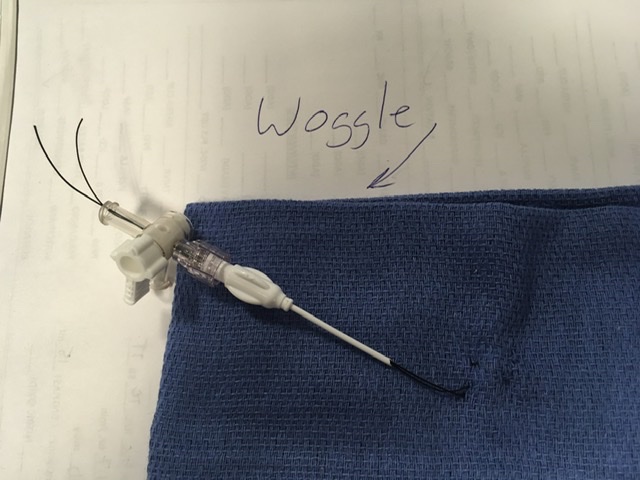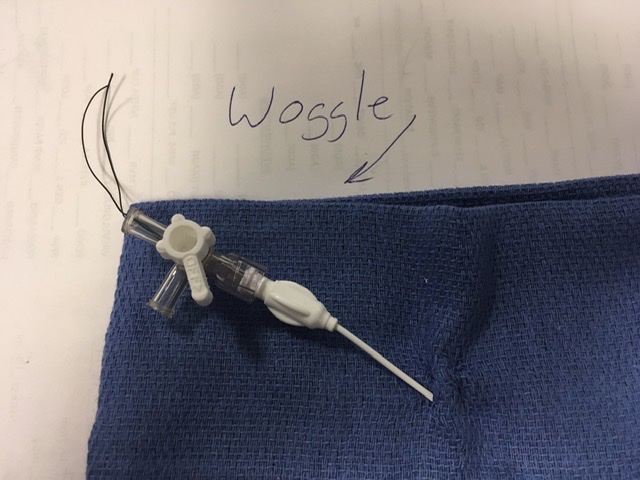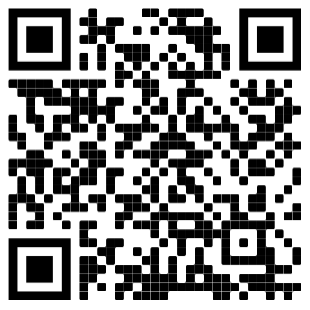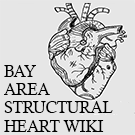Woggle: Difference between revisions
From Bay Area Structural Heart Wiki
No edit summary |
|||
| (6 intermediate revisions by the same user not shown) | |||
| Line 1: | Line 1: | ||
[[File:woggleloose.jpg|thumb|150px|right|Woggle released|link={{filepath:woggleloose.jpg}}]] | [[File:woggleloose.jpg|thumb|150px|right|Woggle released|link={{filepath:woggleloose.jpg}}]] | ||
[[File:woggletight.jpg|thumb|150px|right|Woggle tightened|link={{filepath:woggletight.jpg}}]] | [[File:woggletight.jpg|thumb|150px|right|Woggle tightened|link={{filepath:woggletight.jpg}}]] | ||
[[File:woggleQR.png|thumb|150px|right|QR Code for this page]] | |||
A “Woggle“ is used to secure the skin over a large-bore venous access site after the sheath is removed. | ===About the woggle=== | ||
A “Woggle“ is used to secure the skin over a large-bore venous access site after the sheath is removed. Consisting of a purse-string suture in the skin and a tension device, it provides enough pressure to keep the site from bleeding while allowing the physician to check the site periodically without having to cut and tie a knot. | |||
'''If a patient comes to your unit with a woggle in place, be aware it is not a sheath!''' | '''If a patient comes to your unit with a woggle in place, be aware it is not a sheath!''' | ||
*It does not penetrate the skin | *It does not penetrate the skin | ||
*If you release it, you will most likely have an immediate bleeding situation on your hands. | *If you release it prematurely, you will most likely have an immediate bleeding situation on your hands. | ||
*It does not have to be dressed, but it is best to secure it from being pulled. | *It does not have to be dressed, but it is best to secure it from being pulled. | ||
*It should be left in place no more than 24 hours. Please contact procedure physician! | |||
The procedure physician is aware of the woggle, and will deal with it personally. Under certain circumstances, a nurse may be directed to remove the woggle. | |||
===Removing a woggle=== | |||
Removal of the woggle is straightforward: | |||
#Open the stopcock | |||
#Release the tension on the suture | |||
#Observe for bleeding for 5-10 minutes | |||
#*If bleeding occurs re-tension the suture, lock the stopcock, and inform the physician. | |||
#Disinfect the skin and suture (Chlorohexidine/Betadine) | |||
#If there is no bleeding, remove the tension device | |||
#If exposed, cut middle of suture. If not, cut one end of suture next to skin. | |||
#Gently pull suture from skin | |||
<br /> | <br /> | ||
[[Category:Setups]] | [[Category:Setups]] | ||
Latest revision as of 21:34, 21 April 2025



About the woggle
A “Woggle“ is used to secure the skin over a large-bore venous access site after the sheath is removed. Consisting of a purse-string suture in the skin and a tension device, it provides enough pressure to keep the site from bleeding while allowing the physician to check the site periodically without having to cut and tie a knot.
If a patient comes to your unit with a woggle in place, be aware it is not a sheath!
- It does not penetrate the skin
- If you release it prematurely, you will most likely have an immediate bleeding situation on your hands.
- It does not have to be dressed, but it is best to secure it from being pulled.
- It should be left in place no more than 24 hours. Please contact procedure physician!
The procedure physician is aware of the woggle, and will deal with it personally. Under certain circumstances, a nurse may be directed to remove the woggle.
Removing a woggle
Removal of the woggle is straightforward:
- Open the stopcock
- Release the tension on the suture
- Observe for bleeding for 5-10 minutes
- If bleeding occurs re-tension the suture, lock the stopcock, and inform the physician.
- Disinfect the skin and suture (Chlorohexidine/Betadine)
- If there is no bleeding, remove the tension device
- If exposed, cut middle of suture. If not, cut one end of suture next to skin.
- Gently pull suture from skin
